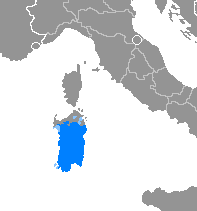Campidanese dialect
Campidanesisch is a collective term for the spoken dialects of the south of Sardinia Sardinian. It is used for differentiation from Logudorese / Nuoresisch and gallurese / Sassaresisch. Although the individual varieties of Campidanesischen each other are much more similar than the other Sardinian dialect groups, there is no " Campidanesischen dialect " in itself. Rather, there are many different dialects that can be assigned to it were a campidanesischen " dialect family."
Grammar
The most striking grammatical feature of Campidanesischen is the specific plural article: In contrast to the logudoresischen and nuoresischen varieties the Campidanesische knows only one article in the plural for both genera, namely is. The singular forms are as in the other Sardinian varieties but su ( masc sing. ) And sa (fem. sing. ). In addition, some differences in tenses, especially the past tenses show.
Phonology
The Campidanesischen dialects do not know a receipt of Latin velar Okklusivs ( / K / ) before -e and- i as the zentralsardischen varieties. The palatalization of the Latin -C leads to similar results as in Italian:
- Eg Latin centu (m) (pronounced / Kentu / ) '100 ' > campidanesisch centu (pronounced / Chengtu /, cf Italian cento ) '.
- Eg Latin nuce (m) (pronounced / nuke / ) ' nut '> campidanesisch Nuxi (pronounced / Nuschi / with a voiced fricative, cf Italian noce ).
In addition, the vowel in unstressed position is a reduction to the vowels -a,- i,- u to watch, similar to the Sicilian (eg campidanesisch Nuxi unlike Logudorese Nuche / nuke ).
Another feature of the campidanesischen dialects is an advanced lenition of unvoiced intervocalic Occlusive (p, t, k ) to their loss, for example, the past participle: cantadu Latin cantatu (m) > campidanesisch Cantau (probably via the intermediate stage, the other in frequently encountered Sardinian varieties is ). A similar phenomenon is the infinitive of certain verbs in-are, here is the -r is affected by shrinkage: Cantai ' sing ' (< Latin cantare ) pappai ' eat ', aggiudai ' help ' (< Latin adjutare ).










